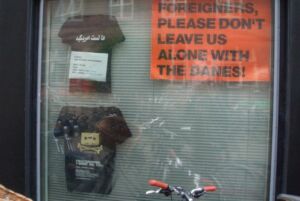News
Political commentator has had enough of the English invasion of Danish society
This article is more than 2 years old.
Jarl Cordua’s opinion piece will be music to the ears of internationals who complain the locals always respond to their linguistic efforts by switching languages

The revolution began in a shop on Strøget … just not this shop (photo: Cory Doctorow/Flickr)
The age-old complaint of internationals in Copenhagen has been that whenever they try to practise their Danish, the locals reply in English.
Well, now the distinguished political commentator Jarl Cordua is calling their bluff!
In yesterday’s Berlingske, he made a rallying call to his fellow Danes to only speak Danish to foreigners.
This is, after all, our country, he reasons, and the people of Denmark should be speaking Danish at all times.
Many foreigners “don’t bother to learn our language. Probably because many find it completely unnecessary, but I also detect a general lack of respect for the Danish language,” he complains.
Time to take action!
Citing a recent report that claims every fifth resident of Copenhagen has a foreign passport – it is also well documented that 24 percent are non-Danes – Cordua claims you wouldn’t know it given the number who insist on speaking English.
And he is baffled that so many of his fellow Danes are happy to sing along to their tune. Increasingly in city centre shops, restaurants and bars, service is offered in English.
“The time has come when we must let go of good manners, take ourselves seriously and start speaking Danish to the foreigners who don’t bother to learn our language!” he contends.
To illustrate his point, Cordua recalled a recent episode in a Strøget clothing shop where he was greeted in English by a female worker, but made a point of responding in Danish.
Much needed labour … but there is a limit
Cordua acknowledges there is “a much-needed supply of in-demand qualified labour” and that most foreigners “contribute to Danish society, fulfill important work functions, and many of them have lengthy educations”.
But he despairs at the number of companies that have adopted English as their official language, to the extent that Danish “is something you only speak in your free time”.
“This ignoring or deliberate disregard of Danish on the part of the business world can only affect foreigners’ respect for the Danish language and culture,” he concludes.
Closing his argument, he cites the example made by politician Peter Hiort-Lorenzen in 1842 who “to the outrage of many German-minded people, insisted on speaking Danish in the Schleswig estate assembly on 11 November 1842, thus igniting a Danish counter-attack on the Germanisation” of the region.










































